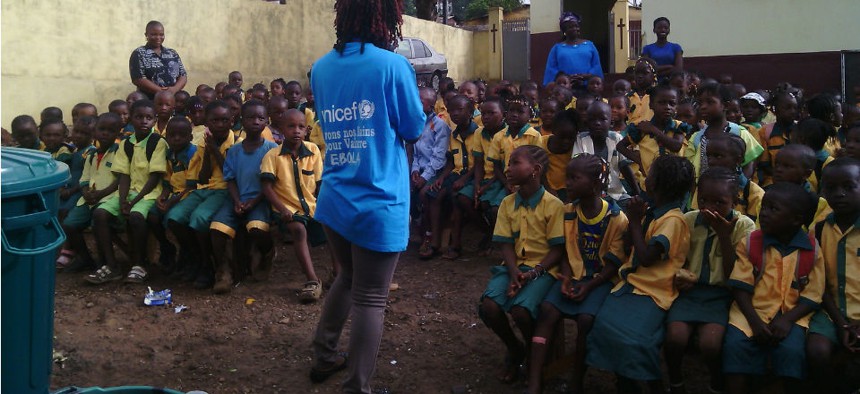
UNICEF and partners educate school children in Conakry, Guinea, about the virus. Flickr user UNICEF Guinea
Government scientists will begin human trials next week on a possible Ebola vaccine, after taking "extraordinary measures" to develop the drug quickly.
The vaccine has performed "extremely well" in animal tests, said Anthony Fauci, the director of the National Institutes of Health's infectious diseases unit. It's designed to inoculate patients from two strains of Ebola, including the one responsible for the outbreak in West Africa that has killed more than 1,500 people.
Despite the measures taken to speed up the development process, Fauci said it's "impossible to predict" when a vaccine might be ready and approved for use by health care workers headed to West Africa.
The initial round of human trials will focus on the drug's safety. Ultimately, 20 patients will receive the drug at NIH's facilities in Maryland, where scientists will determine whether the drug is safe and whether it provokes the same "immune response" in humans that it does in chimpanzees. Test subjects won't be given Ebola, and they cannot become infected with the virus by taking the vaccine, Fauci said.
He said NIH will have the results from this study by the end of the year. The next steps will depend on those results as well as the state of the Ebola outbreak.
Initial human tests are also set to begin soon for at least three other potential vaccines.
Developing a vaccine is different from developing a treatment for infected patients, Fauci stressed during a conference call with reporters. Experimental treatments have been provided to Ebola patients during the current outbreak even though they've never been tested in humans—because if you already have Ebola, you don't have much to lose from taking a drug that might not work.
But because vaccines are administered to healthy people, there's a higher bar to make sure they work, or at least aren't dangerous. "The worst thing you could do," Fauci said, is to release a vaccine that hasn't been tested for safety and ends up making healthy people sick or more susceptible to Ebola.
"You really can't predict what you might see," he said.
NIH developed the drug in collaboration with GlaxoSmithKline. Getting a large drug company involved helps ensure that the vaccine can be produced in large quantities, Fauci said. Some experimental treatments were developed by smaller firms that have run out of their products.
NEXT STORY: Unlocking Federal Talent






